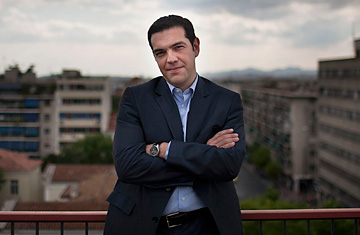
Greek Politician Alexis Tsipras, on the rooftop of Syriza Party Headquarters.
(2 of 5)
So Greece out of the euro, is that not an option for you?
No, it's not an option. It is not our choice for Greece to exit the euro zone. First of all, it will have a negative impact to low-income Greeks.
We also don't believe that the solution should be the outcome of a competition between European countries — for instance the competition between the Greek people and the Spanish people, which for instance would lead Greeks back to drachma and the Spaniards back to the peseta. We believe in a Europe of solidarity and social cohesion.
So, if we want to talk about solidarity, we should take under consideration where the money of the European taxpayers, which is given to Greece as a financial aid, really goes. Is it thrown in a bottomless pit or is it invested in growth projects to help the cohesion of the society? Until now it was given to cover the black hole of the banks and this must be stopped.
When someone is bankrupt and instead of giving them the opportunity to work in order to pay back their debt, you give them loans to pay back the previous ones, under the condition that they will never work again. You don't save them that way. On the contrary, you make them hostages of a disastrous policy. We think that this must change, and it is already late for it. It should have changed from the beginning, when it became clear that these policies are not bearing any fruit.
[Pro-bailout politicians] saw the first [bailout] package fail and yet they led us to the second one. They should get used to the idea that we will not have a third one.
So since it was so clear that things weren't working, why was there a second memorandum of agreement between Greece and international lenders for billions more in bailout loans?
You should ask the policymakers in Brussels this question. I think it's a combination of an irrational insistence and a neoliberal mantra. Europe is at a crossroad, the same crossroads that it was at during the 1930's in the aftermath of the economic crisis of 1929. Back then, all the world was at a crossroads. At the other coast of the Atlantic ocean, USA followed the New Deal policy by Franklin Roosevelt. Europe, on the contrary, chose the policies of fiscal discipline which led eventually to the rise of national socialism and Nazism at the heart of Europe, at Germany.
The populist movement of national socialism gave a bunch of crazy people the chance to drive Europe to the calamity of World War II. I don't want to be a Cassandra but either we will become wiser from our past experience — we will realize that Roosevelt was right and follow that path — or Ms. Merkel will insist on her policies, which lead to a dead end. She will bear heavy responsibility for bringing down the euro zone and European Union. She may even bear responsibility for widespread instability in the region. Because nowadays the euro is the second biggest reserve currency in the world.
Let's go back to the memorandum. You've talked about renegotiation. What do you specifically do you want to renegotiate?
We will not renegotiate the bailout agreement. This agreement is dead, since May 6 [elections], and it will definitely be forgotten on June 16 [new election]. We will negotiate, on a political level, the relation of our country with the other 16 countries of the euro zone, as well as the possibility of this necessary financing to be continued on different agreed terms. Terms which will lead to results.
We want our European partners to accept what is fair for Greece and adopt a plan for fair fiscal reforms, and economic and social growth. It may take time, but we need to avoid more pauperization of this country. Today a big part of the Greek population has lost its dignity.
And the Europeans say, sorry, Mr. Tsipras, we don't like your plan?
Indeed, we would be in a really difficult position if this was Europe's reaction. However, we have an alternative plan, focused on supporting the most vulnerable and sensitive social groups, that we will implement in that difficult situation. Our European partners should know that if they adopt that position with ease, then the problem will not be just in Greece, it will no doubt expand to the rest of Europe, because the markets have neither moral barriers nor discretion.
If you give one hand to the markets, they will devour the other one as well. They are like flocks of wild animals, driven by their instincts and the smell of blood. Hence, either there will be decisive policies which will calm them down or — if there will be clumsy policies of conciliation — the markets will devour politics in Europe and in the rest of the world.
Let me be more specific: If they stop financing Greece, it will give the green light for the markets to expand their aggressive speculation to Spain and Italy and these countries will be thrown out of the markets as well, at the beginning into the same bailout mechanism and later on out of that too. No one should think in this immature, silly way. Therefore, I believe that the European leaders will have the nerve to acknowledge that it is better to admit their mistake than to risk the well-being of millions of people around Europe.
So you think that they will do it?
I have a feeling that they will do it [i.e., admit their mistake]
